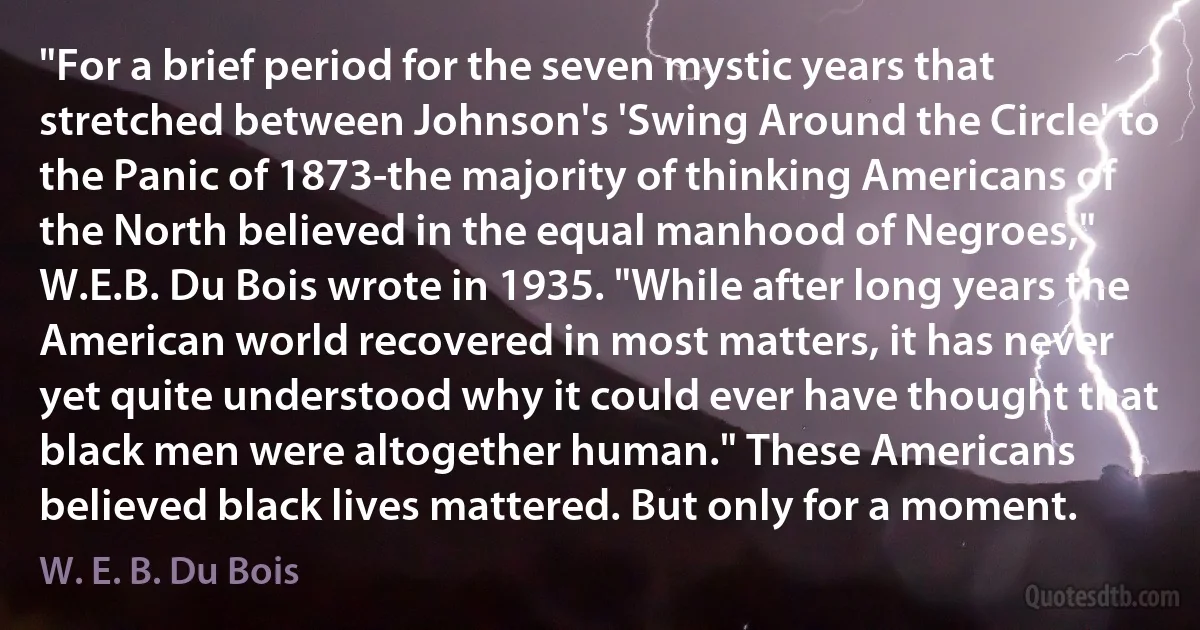Seven Quotes - page 49
A country is strong which consists of wealthy families, every member of whom is interested in defending a common treasure; it is weak when composed of scattered individuals, to whom it matters little whether they obey seven or one, a Russian or a Corsican, so long as each keeps his own plot of land, blind in their wretched egotism, to the fact that the day is coming when this too will be torn from them.

Honoré de Balzac
[Naaman] dipped himself," it says, "seven times in Jordan." It was not for nothing that Naaman of old, when suffering from leprosy, was purified upon his being baptized, but as an indication to us. For as we are lepers in sin, we are made clean by means of the sacred water and the invocation of the Lord from our old transgressions, being spiritually regenerated as new-born babes, even as the Lord has declared: "Except a man be born again through water and the Spirit, he shall not enter into the kingdom of heaven.

Irenaeus
The World Game is a precisely defined design science process for arriving at economic, technological and social insights pertinent to humanity's future involvement aboard our planet Earth. The processes consist of mathematical procedures not only as incisive and complex as those involved in celestial navigation, or astro-ballistics, or the space program, but even more so-for, in addition to all the variables common to those sciences and The World Game, the latter involves also all the variables governing the planning of the programs of the industrialization of both Russia and China....The World Game is seven times more complex than China's quarter century industrialization and thirty-five times more complex than was Russia's industrialization problem. The World Game must find the specific means of making five billion humans a total economic and physical success at the earliest possible moment without anyone being advantaged at the expense of another.

Buckminster Fuller
The seven to two judgment in Roe v. Wade declared "violative of the Due Process Clause of the Fourteenth Amendment” a Texas criminal abortion statute that intolerably shackled a woman's autonomy; the Texas law "except[ed] from criminality only a life-saving procedure on behalf of the [pregnant woman].” Suppose the Court had stopped there, rightly declaring unconstitutional the most extreme brand of law in the nation, and had not gone on, as the Court did in Roe, to fashion a regime blanketing the subject, a set of rules that displaced virtually every state law then in force. Would there have been the twenty-year controversy we have witnessed, reflected most recently in the Supreme Court's splintered decision in Planned Parenthood v. Casey? A less encompassing Roe, one that merely struck down the extreme Texas law and went no further on that day, I believe and will summarize why, might have served to reduce rather than to fuel controversy.

Ruth Bader Ginsburg
I've always been a storyteller. Before I could write, I used to make up stories and tell them to my friends and family. They were always really dramatic, with ghosts and people falling into holes in the ground, and ships lost at stormy seas. Then, I started drawing comic strips and I would show them to my mom and narrate them. As soon as I learned the alphabet I started writing stories and poems. I wrote every day, usually in the afternoons, when my parents were napping. My sister (who is seven years older) and my father recognized my love of storytelling and writing early on, and they fostered and encouraged it...

Ayelet Tsabari
My point of view of Korea is a child's point of view. Because I left when I was seven and a half, there was an enormous amount of innocence. While I was growing up, a lot of horrible things happened politically in South Korea, and yet, I had a mother who was teaching piano at home. I remember things like getting ice cream as treats if we had some extra money, or how my father always wore a suit to the office; that's sort of what I remember as a child. And that innocence is really nice because, now that I learned the historical aspect of what was really going on, I think, gosh, they must have been terrified in some ways. They must have been terrified sufficiently to say, "We would like to immigrate to another country and start all over again being essentially working class.”.

Min Jin Lee
[Sociocultural] explanations are vulnerable to a number of criticisms. To begin with, it is unclear to what extent current social influences actually point in the direction these explanations presuppose. According to one study, by four years of age, girls tend to assume that boys are academically inferior, and by seven, boys assume the same thing. Similarly, teachers tend to view their female students as superior at maths and reading, even when aptitude tests indicate that the boys are doing better. Popular culture often mirrors these trends, with girls depicted as academically superior to boys (consider, for instance, Bart and Lisa from The Simpsons, and Ron and Hermione from the Harry Potter series.

Steve Stewart-Williams
America isn't easy. America takes work. Today, February 12, is Abraham Lincoln's birthday. He spoke at Gettysburg about a 'new birth of freedom' because we spent the first four score and seven years of our history with fellow Americans held as slaves. President Healy, his siblings, and his mother among them. We have spent the 150 years since Lincoln spoke making great progress, but along the way treating a whole lot of people of color poorly. And law enforcement was often part of that poor treatment. That's our inheritance as law enforcement and it is not all in the distant past.

James Comey
Scientists and technicians should concentrate their energies on their professional work. When we say that at least five-sixths of their work time should be left free for professional work, this is meant as the minimum requirement. It would be better still if more time were made available. If someone works seven days and seven nights a week to meet the needs of science or production, it shows his lofty and selfless devotion to the cause of socialism. We should commend, encourage and learn from such people. It has been demonstrated countless times that only those who devote themselves heart and soul to their work, who constantly strive for perfection and fear neither hardship nor disappointment can reach the pinnacles of science. We cannot demand that scientists and technicians, or at any rate, the overwhelming majority of them, study stacks of books on political theory, join in numerous social activities and attend many meetings not related to their work.

Deng Xiaoping
A hermetic parable may have up to seven separate meanings to Adepts of increasing levels. Space being limited, suffice it to say here that the virgin found in so many ancient mystery religions represented the womb of the Mysteries. The crucified Saviors, of which there were at least 16 prior to Christianity, represent the the Mysteries themselves, which are continually destroyed or corrupted by tyrants, but which, by the efforts of the Secret Brotherhood, are preserved and resurrected. And the Mysteries themselves are knowledge of nature's deepest secrets, functions and laws.

David Lane (white nationalist)
[on the creation myth] This is a wonderful story that was told to the people in the desert, in order to distract them from the fact that they did not have air conditioning. I would love to have the faith to believe that it took place in seven days, but... I have thoughts. And that can really fuck up the faith thing. Just ask any Catholic priest.

Lewis Black
America...is being lost through television. Because in advertising, mendacity and manipulation are raised to the level of internal values for the advertisers. Interruption is seen as a necessary concomitant to marketing. It used to be that a seven– or eight-year old could read consecutively for an hour or two. But they don't do that much anymore. The habit has been lost. Every seven to ten minutes, a child is interrupted by a commercial on TV>Kids get used to the idea that their interest is there to be broken into. In consequence, they are no longer able to study as well. Their powers of concentration have been reduced by systematic interruption.

Norman Mailer
I swear to you, then," said MacIan, after a pause. "I swear to you that nothing shall come between us. I swear to you that nothing shall be in my heart or in my head till our swords clash together. I swear it by the God you have denied, by the Blessed Lady you have blasphemed; I swear it by the seven swords in her heart. I swear it by the Holy Island where my fathers are, by the honour of my mother, by the secret of my people, and by the chalice of the Blood of God."
The atheist drew up his head. "And I," he said, "give my word.

G. K. Chesterton
So long as you continue to successfully defend your title, being an IFBB pro bodybuilding champ affords you the privilege to compete in events of your choosing. Why risk over-peaking or the stress of competitive burnout when you can gradually ease into competition mode and leave nothing to chance? This certainly appears the case for seven-time Ms. Olympia Iris Kyle, who has not lost a contest since 2005 (though to be fair, she has only competed ten times over the past seven years). Despite being at an age (38) where many female competitors would have retired, she continues to improve. As the reigning champ, the veteran Kyle will need to be better than ever with the best Ms. Olympia field in recent memory set to throw down at the Orleans Arena. Her stunning width, untouchable shape, and full muscular development should give arguably the greatest female bodybuilder of all time a slight advantage to win her eighth consecutive championship.

Iris Kyle
The only person who can beat Iris in this show is Iris -that's the consensus with female bodybuilding fans, and it's tough to argue. Iris has won seven years in a row and has a total of eight Olympia titles on her competitive resume. Her shape, size, and conditioning are tough to beat. If Iris duplicates the formula she's shown the previous few years, she'll become the all-time Olympia titleholder. The bottom line: Don't bet against her making history on Saturday night.

Iris Kyle
Hitler: Look, I was a bad guy. No question. I hate that Hitler. The yelling, the finger-pointing, I don't know... I was a very angry guy.
King: And this... new Hitler?
Hitler: I get up at seven, have half a melon, do the Jumble in the morning paper and then let the day take me where it will. Some days I'll fish, maybe hit the mall for an Orange Julius. The other day I spent seven hours in the park watching ants cart off part of a sandwich. Me!! The inventor of the Blitzkrieg... When you stop having to control everything, it's very freeing.

Jon Stewart


![[Having to negotiate new trading rules from scratch would lead to a long period of unacceptable uncertainty for British business.] Seven years of not knowing what the arrangements would be for trading with Europe... Seven years of uncertainty for businesses wanting to invest in Britain not knowing what our relationship with Britain would be. They cannot be justified. They cannot be in our national interest. We should reject that out of hand. (David Cameron)](https://cdn.quotesdtb.com/img/quotes_images_webp/45/david-cameron-british-business-1003245.webp)
